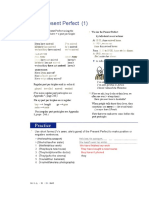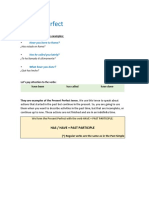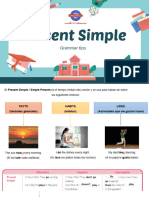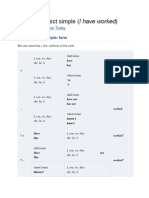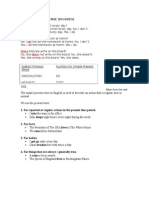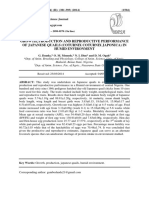0 ratings0% found this document useful (0 votes)
11 views(Sem 3) PRESENT PERFECT
(Sem 3) PRESENT PERFECT
Uploaded by
BETTY JUDITH MACHACA ZAPANAThe document discusses the present perfect tense in Spanish. It provides the conjugations of "have/has" as auxiliary verbs used with the past participle. Examples are given for positive sentences with I, you, he, she, it, we, and they. The document also addresses negative sentences, question forms, and using the present perfect with time expressions.
Copyright:
© All Rights Reserved
Available Formats
Download as PDF, TXT or read online from Scribd
(Sem 3) PRESENT PERFECT
(Sem 3) PRESENT PERFECT
Uploaded by
BETTY JUDITH MACHACA ZAPANA0 ratings0% found this document useful (0 votes)
11 views4 pagesThe document discusses the present perfect tense in Spanish. It provides the conjugations of "have/has" as auxiliary verbs used with the past participle. Examples are given for positive sentences with I, you, he, she, it, we, and they. The document also addresses negative sentences, question forms, and using the present perfect with time expressions.
Original Title
(sem 3)PRESENT PERFECT
Copyright
© © All Rights Reserved
Available Formats
PDF, TXT or read online from Scribd
Share this document
Did you find this document useful?
Is this content inappropriate?
The document discusses the present perfect tense in Spanish. It provides the conjugations of "have/has" as auxiliary verbs used with the past participle. Examples are given for positive sentences with I, you, he, she, it, we, and they. The document also addresses negative sentences, question forms, and using the present perfect with time expressions.
Copyright:
© All Rights Reserved
Available Formats
Download as PDF, TXT or read online from Scribd
Download as pdf or txt
0 ratings0% found this document useful (0 votes)
11 views4 pages(Sem 3) PRESENT PERFECT
(Sem 3) PRESENT PERFECT
Uploaded by
BETTY JUDITH MACHACA ZAPANAThe document discusses the present perfect tense in Spanish. It provides the conjugations of "have/has" as auxiliary verbs used with the past participle. Examples are given for positive sentences with I, you, he, she, it, we, and they. The document also addresses negative sentences, question forms, and using the present perfect with time expressions.
Copyright:
© All Rights Reserved
Available Formats
Download as PDF, TXT or read online from Scribd
Download as pdf or txt
You are on page 1of 4
PRESENT PERFECT
PAST PARTICIPLE
AUXILIAR HAVE HAS = ADO - IDO
SUBJECT + HAVE/HAS + PAST PARTICIPLE + OBJECT
I HAVE = YO
You
He
HAVE = TU
HAS = EL
ADO
She HAS = ELLA
It HAS = ESO / ELLO
We
They
HAVE = NOSOTROS
HAVE = ELLOS
IDO
I have [I’ve] talked to Peter.
YO He hablado con Peter.
She has [She’s] gone to work.
ELLA Ha ido a su trabajo.
We have [We’ve] been to London.
NOSOTROS Hemos ido a Londres.
They have [They’ve] learned English.
ELLOS Han aprendido inglés.
NEGATIVE SENTENCE
I have not talked to Peter.
YO No he hablado con Peter.
She hasn’t gone to work.
No ha ido a su trabajo.
We haven’t been to London.
No hemos ido a Londres.
QUESTION FORMS
They haven’t learned English.
Have you talked to Peter? ELLOS No han aprendido inglés.
¿Has hablado con Peter?
Has she gone to work?
¿ELLA Ha ido a su trabajo?
Have you been to London?
¿Has ido a Londres?
Have they learned English?
¿ELLOS Han aprendido inglés?
Se puede usar el presente
perfecto con expresiones de
tiempo no concretas (“never”,
“ever”, “many times”, “for”,
“since”, “already”, “yet”…)
I have never flown in a plane.
Nunca he volado en un avión.
He has worked in many different museums.
Ha trabajado en muchos museos diferentes.
We have NEVER been to Río de Janeiro.
NOSOTROS NUNCA Hemos ido a Río de Janeiro.
You might also like
- Present Tenses, Past Tenses, Future TensesDocument57 pagesPresent Tenses, Past Tenses, Future Tensesashuichi941No ratings yet
- TENSESDocument11 pagesTENSESSiti NorlizaNo ratings yet
- Intermediate 1Document30 pagesIntermediate 1s_srodriguez11No ratings yet
- Have Got Tener To Have.: He/ She/ ItDocument6 pagesHave Got Tener To Have.: He/ She/ ItJohalan VNo ratings yet
- Definition of The Present Perfect TenseDocument7 pagesDefinition of The Present Perfect Tensemounib khaddourNo ratings yet
- Yet, Already, Never PDFDocument1 pageYet, Already, Never PDFBahman AdabiNo ratings yet
- Present Perfect + Ever, Never, Already, YetDocument2 pagesPresent Perfect + Ever, Never, Already, YetLavinia Surmei100% (1)
- Definition of The Present Perfect TenseDocument14 pagesDefinition of The Present Perfect TenseWaad AlteeNo ratings yet
- Tiempo Verbal Afirmación Negación InterrogaciónDocument7 pagesTiempo Verbal Afirmación Negación InterrogaciónJorge ValenzuelaNo ratings yet
- Portofoliu: GeografieDocument25 pagesPortofoliu: GeografieDANANo ratings yet
- Activity #2: Colegio de Estudios Científicos Y Tecnológicos de Pabellón de ArteagaDocument3 pagesActivity #2: Colegio de Estudios Científicos Y Tecnológicos de Pabellón de ArteagaLucero LCNo ratings yet
- 4 The Present Perfect TenseDocument6 pages4 The Present Perfect TenseKate BarreraNo ratings yet
- Often Confused Verbs - Rules: Make and DoDocument3 pagesOften Confused Verbs - Rules: Make and DoMarta PuigaNo ratings yet
- Guía Pedagógica de Inglés NDocument8 pagesGuía Pedagógica de Inglés NBrayajn OrtegaNo ratings yet
- Present Perfect Simple: Academia "Ateneo" - La RiojaDocument11 pagesPresent Perfect Simple: Academia "Ateneo" - La RiojaGermán Darío de la Vega100% (1)
- Present Perfect-Group 3 - CompressedDocument38 pagesPresent Perfect-Group 3 - CompressedDULCE MP100% (1)
- Present Perfect SimpleDocument5 pagesPresent Perfect SimpleBondfriendsNo ratings yet
- Past Simple Vs Present PerfectDocument4 pagesPast Simple Vs Present PerfectLolaMilickovicNo ratings yet
- Greting: Oh - Zero One Two Tree Four Five Six Seven Eight Nine TenDocument7 pagesGreting: Oh - Zero One Two Tree Four Five Six Seven Eight Nine TenGeorge Frank Arroyo SanchezNo ratings yet
- Present Perfect TheoryDocument5 pagesPresent Perfect TheoryDjYaGo 705No ratings yet
- Simple Present: Does He Play Tennis?Document6 pagesSimple Present: Does He Play Tennis?lopes martinezNo ratings yet
- English Course 1Document11 pagesEnglish Course 1Paola ReyesNo ratings yet
- Presentation Ingles2Document18 pagesPresentation Ingles2Pinel GustavoNo ratings yet
- TALLERnPRESENTnPERFECTnREALIZADOn1 5760ca88564effaDocument6 pagesTALLERnPRESENTnPERFECTnREALIZADOn1 5760ca88564effaYULY BUITRAGONo ratings yet
- Prepositions & Present PerfectDocument6 pagesPrepositions & Present PerfectLo RaveNo ratings yet
- Portofoliu Engleza: Scoala ''Duiliu Zamfirescu Focsani''Document27 pagesPortofoliu Engleza: Scoala ''Duiliu Zamfirescu Focsani''DANANo ratings yet
- Portofoliu Engleza: Scoala ''Duiliu Zamfirescu Focsani''Document27 pagesPortofoliu Engleza: Scoala ''Duiliu Zamfirescu Focsani''DANANo ratings yet
- TeoriaDocument4 pagesTeoriaAyluNo ratings yet
- Apuntes 1QDocument22 pagesApuntes 1QRegister AdvertisementsNo ratings yet
- Presentperfect-Simple VS SIMPLE PASTDocument14 pagesPresentperfect-Simple VS SIMPLE PASTCarla GandiniNo ratings yet
- What Is The Subject in A Sentence?Document11 pagesWhat Is The Subject in A Sentence?Alison Andrea SanchezNo ratings yet
- Present TenseDocument32 pagesPresent TenseAUDRY DUNEYSKA LEMUS FINONo ratings yet
- Present SimpleDocument23 pagesPresent SimpleAldana RodriguezNo ratings yet
- APUNTES EOI B2 INGLÉS PDFDocument167 pagesAPUNTES EOI B2 INGLÉS PDFashley.cpNo ratings yet
- Present Perfect Simple (I Have Worked) : English Grammar TodayDocument26 pagesPresent Perfect Simple (I Have Worked) : English Grammar TodayEurico BrassoNo ratings yet
- Auxiliary VerbsDocument21 pagesAuxiliary VerbsyasameenaniNo ratings yet
- Present Perfect PowerPoint Inlingua DC Level 4 Grammar 2BDocument12 pagesPresent Perfect PowerPoint Inlingua DC Level 4 Grammar 2BPaul NicklasNo ratings yet
- WiderWorld2e 2 GrammarPresentation 9.2Document6 pagesWiderWorld2e 2 GrammarPresentation 9.2cooleugene64No ratings yet
- Session 3 - Past TensesDocument7 pagesSession 3 - Past TensesAna HernándezNo ratings yet
- Simple PresentDocument28 pagesSimple PresentCarlosRamosNo ratings yet
- 3 Present Perfect 2 ESODocument2 pages3 Present Perfect 2 ESOpsxoveNo ratings yet
- Present Perfect With Ever and NeverDocument20 pagesPresent Perfect With Ever and NeverMeybalex GANo ratings yet
- Simple PresentDocument11 pagesSimple PresentLuciaJausoroNo ratings yet
- I.Guia Didáctica 4° Año - Verb Tenses (Goal)Document5 pagesI.Guia Didáctica 4° Año - Verb Tenses (Goal)Manuel Alejandro Gutierrez NuñezNo ratings yet
- Present Perfect Present Perfect ContinuousDocument11 pagesPresent Perfect Present Perfect ContinuousFurryPriiiko100% (1)
- Past Simple TenseDocument45 pagesPast Simple TenseFernando Yamashita CarranzaNo ratings yet
- PRESENT PERFECT (Past Participle)Document1 pagePRESENT PERFECT (Past Participle)Sayuri RiveraNo ratings yet
- Present Perfect TenseDocument9 pagesPresent Perfect TenseSHAYRA CELESTE MELGAREJO LORANo ratings yet
- Present Tense PDFDocument21 pagesPresent Tense PDFNilmanisNo ratings yet
- Use of Do and Have VerbsDocument10 pagesUse of Do and Have VerbsShams SNo ratings yet
- The Verb To Be in PastDocument12 pagesThe Verb To Be in PastMarlene ZuñigaNo ratings yet
- English GrammarDocument24 pagesEnglish GrammarjorgeNo ratings yet
- CH 3 Present Perfect Vs Present Perfect ContinuousDocument28 pagesCH 3 Present Perfect Vs Present Perfect ContinuousIndra WijayaNo ratings yet
- Present Perfect SimpleDocument19 pagesPresent Perfect Simpleapi-252190418100% (4)
- Structure Meeting 3Document2 pagesStructure Meeting 3Yowanda Rosaly NdunNo ratings yet
- Present ContinuousDocument12 pagesPresent ContinuousCristian Ramirez RodasNo ratings yet
- Class TodayDocument26 pagesClass TodayNelly Lotero100% (1)
- Curso IntensivoDocument28 pagesCurso IntensivoKari Michelle HBNo ratings yet
- Present Perfect-Wps OfficeDocument3 pagesPresent Perfect-Wps OfficeRohma FidaNo ratings yet
- Growth, Production and Reproductive Performance of Japanese Quails (Coturnix Coturnix Japonica) in Humid EnvironmentDocument15 pagesGrowth, Production and Reproductive Performance of Japanese Quails (Coturnix Coturnix Japonica) in Humid EnvironmentBETTY JUDITH MACHACA ZAPANANo ratings yet
- (Sem 4) PAST SIMPLEDocument9 pages(Sem 4) PAST SIMPLEBETTY JUDITH MACHACA ZAPANANo ratings yet
- A READING TEST (Sem 2)Document2 pagesA READING TEST (Sem 2)BETTY JUDITH MACHACA ZAPANANo ratings yet
- (Sem 6) PAST CONTINUOUSDocument7 pages(Sem 6) PAST CONTINUOUSBETTY JUDITH MACHACA ZAPANANo ratings yet
- (Sem 7) PAST PERFECTDocument8 pages(Sem 7) PAST PERFECTBETTY JUDITH MACHACA ZAPANANo ratings yet
- (Sem 7) PAST PERFECT CONTINUOUSDocument7 pages(Sem 7) PAST PERFECT CONTINUOUSBETTY JUDITH MACHACA ZAPANANo ratings yet























